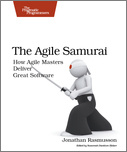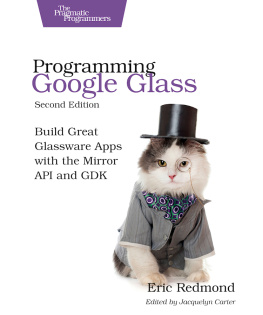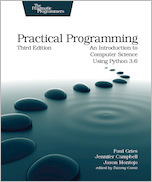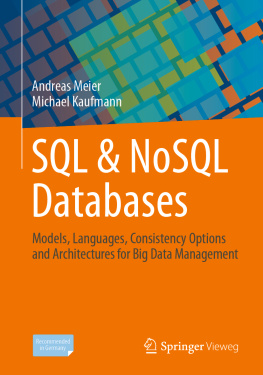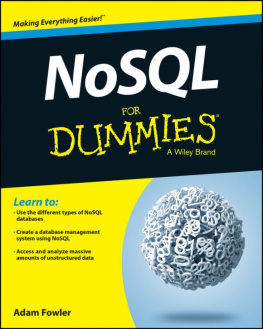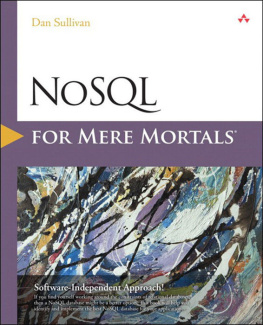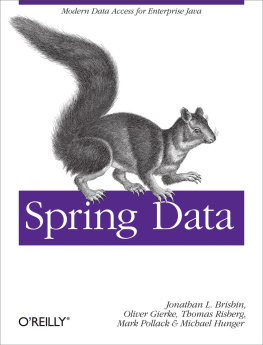Eric Redmond - Seven Databases in Seven Weeks: A Guide to Modern Databases and the NoSQL Movement
Here you can read online Eric Redmond - Seven Databases in Seven Weeks: A Guide to Modern Databases and the NoSQL Movement full text of the book (entire story) in english for free. Download pdf and epub, get meaning, cover and reviews about this ebook. year: 2012, publisher: Pragmatic Bookshelf, genre: Computer. Description of the work, (preface) as well as reviews are available. Best literature library LitArk.com created for fans of good reading and offers a wide selection of genres:
Romance novel
Science fiction
Adventure
Detective
Science
History
Home and family
Prose
Art
Politics
Computer
Non-fiction
Religion
Business
Children
Humor
Choose a favorite category and find really read worthwhile books. Enjoy immersion in the world of imagination, feel the emotions of the characters or learn something new for yourself, make an fascinating discovery.
- Book:Seven Databases in Seven Weeks: A Guide to Modern Databases and the NoSQL Movement
- Author:
- Publisher:Pragmatic Bookshelf
- Genre:
- Year:2012
- Rating:4 / 5
- Favourites:Add to favourites
- Your mark:
Seven Databases in Seven Weeks: A Guide to Modern Databases and the NoSQL Movement: summary, description and annotation
We offer to read an annotation, description, summary or preface (depends on what the author of the book "Seven Databases in Seven Weeks: A Guide to Modern Databases and the NoSQL Movement" wrote himself). If you haven't found the necessary information about the book — write in the comments, we will try to find it.
Data is getting bigger and more complex by the day, and so are the choices in handling that data. As a modern application developer you need to understand the emerging field of data management, both RDBMS and NoSQL. Seven Databases in Seven Weeks takes you on a tour of some of the hottest open source databases today. In the tradition of Bruce A. Tates Seven Languages in Seven Weeks, this book goes beyond your basic tutorial to explore the essential concepts at the core each technology.
Redis, Neo4J, CouchDB, MongoDB, HBase, Riak and Postgres. With each database, youll tackle a real-world data problem that highlights the concepts and features that make it shine. Youll explore the five data models employed by these databases-relational, key/value, columnar, document and graph-and which kinds of problems are best suited to each.
Youll learn how MongoDB and CouchDB are strikingly different, and discover the Dynamo heritage at the heart of Riak. Make your applications faster with Redis and more connected with Neo4J. Use MapReduce to solve Big Data problems. Build clusters of servers using scalable services like Amazons Elastic Compute Cloud (EC2).
Discover the CAP theorem and its implications for your distributed data. Understand the tradeoffs between consistency and availability, and when you can use them to your advantage. Use multiple databases in concert to create a platform thats more than the sum of its parts, or find one that meets all your needs at once.
Seven Databases in Seven Weeks will take you on a deep dive into each of the databases, their strengths and weaknesses, and how to choose the ones that fit your needs.
What You Need:
To get the most of of this book youll have to follow along, and that means youll need a *nix shell (Mac OSX or Linux preferred, Windows users will need Cygwin), and Java 6 (or greater) and Ruby 1.8.7 (or greater). Each chapter will list the downloads required for that database.
Eric Redmond: author's other books
Who wrote Seven Databases in Seven Weeks: A Guide to Modern Databases and the NoSQL Movement? Find out the surname, the name of the author of the book and a list of all author's works by series.

